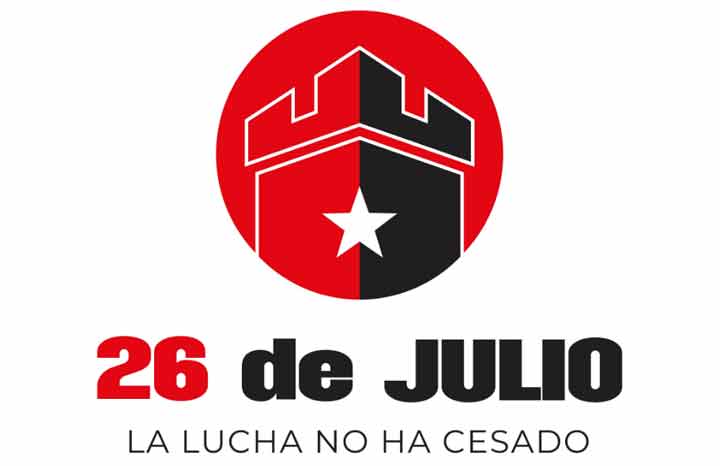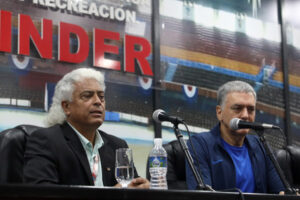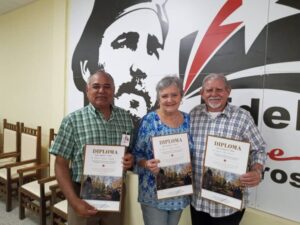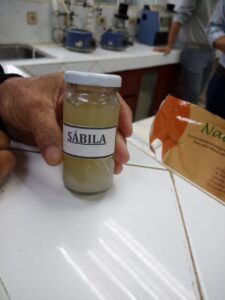If Only All Municipalities Pursuing Autonomy and Food Sovereignty Could Practically Understand This
Majagua, Ciego de Ávila – While many immediately associate this municipality with its fierce tradition of two rival factions (red and blue) whose cultural contests grow more fraternal with time, or with high-quality oil for national lubricant production, one cannot overlook that the canning factory – as locals call it – equally embodies Majagua’s spirit.
It’s not just its origins (1957), nor its provision of employment for those committed to work despite wages, scarcities, or obstacles… It represents the strategic privilege of knowing that hard-won harvests – which elsewhere might perish – can here be salvaged, processed, canned, and destined for ever-needed consumption.
The collective’s persistence overcomes rigorous working conditions. Photo: Pastor Batista Valdés
THE «MINE» CANNOT BE EXPLOITED
Jorge Humberto Calvo Fariñas, the factory director, is no newcomer. Years before working here, he’d heard how roughly 40% of Cuba’s tomatoes were grown in Majagua, chiefly in Mamonal.
Imagine peak harvest arriving without local infrastructure to process it swiftly, risking massive losses.
True, major plants in Ceballos (near the provincial capital) and Florencia’s ageing factory, plus ~20 mini-canning facilities, offer backup. Yet distance to Ceballos, transport hurdles, industrial bottlenecks during high-volume periods, and other unforeseen issues repeatedly prove nothing matches local capacity – echoing the very concept of territorial autonomy.
In short, «true mines» like tomatoes or mangos here cannot be exploited without solid foundations.
«Fortunately, we’ve experienced the opposite,» says Jorge Humberto. «When Ceballos halted temporarily, we processed La Cuba’s tomatoes smoothly, plus volumes from Jatibonico and Mamonal – totalling 136,000 quintals (final tomato yield), our best year in 4-5 seasons.»
«Another example: In 2023, La Estancia (Sancti Spíritus) faced difficulties. We accepted their request, producing ~1 million tins of children’s compote for all Cuba.»
Despite occasional resource shortages, sensitive products like tomatoes are never left unprocessed. Photo: Pastor Batista Valdés
INGENUITY AGAINST ALL ODDS
Readers might envision gleaming, Swiss-clock-precision production lines. Reality: predominantly obsolete equipment, kept running by talent, passion, and belonging from those who «operate and stitch it back together» during breakdowns.
«These machines process not just tomatoes or mangos,» explains Yordán Pina Vera, process technician, «but also pineapples for juice and concentrated jam.»
The clearest proof of persistence? A Chinese-assisted investment ~6 years ago to boost capacity and hygiene standards. Due to adaptations, workers now quip «that section’s practically more Cuban than Chinese» – but crucially, it functions.
It would be naive to hide energy shortages’ brutal impact. «Once,» recalls Jorge, «tomatoes waited here ten days. Same with pineapples. Producers panic – understandably – after sacrificing so much.»
Water scarcity (vital for operations) and packaging limitations compound issues. Bag alternatives are inadequate: only 176 tonnes of mangos processed so far vs. 1,000+ same time last year.
UTILISING EVERY SEED
This phrase encapsulates the mindset of valuing all resources and rejecting waste. Among those embodying this is Mireya Ledezma: 43 years here since age 18, now immovable from the spice processing line, her nose long immune to cumin’s pungency.
Similarly, Eduardo Gómez – whose childhood memories feature his father’s quality control work here – never imagined this would be his sole workplace since age 17.
Unprompted, Jorge Humberto highlights his team’s quality: «They always deliver, even when I wish I could provide better conditions, especially meals – currently inadequate.»
«When we mobilised for La Estancia’s children’s compote emergency, workers used their own transport and brought homemade lunches. These are my people – why this factory keeps fighting and winning.»
(Author: Pastor Batista Valdés)




